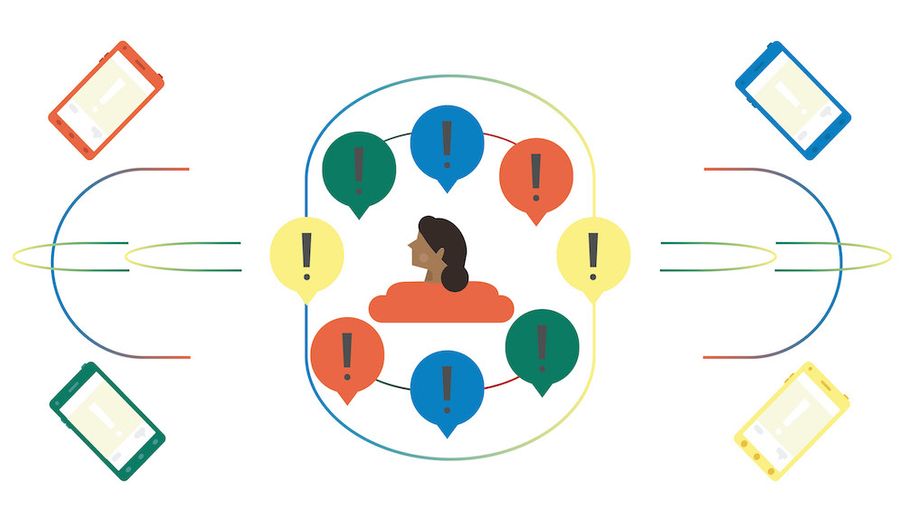We all like to have our thoughts and opinions validated; it’s a part of what makes us feel connected to others. But what happens when we only engage with those that share our view of the world, and tune-out everything else?
What image does the term ‘echo chamber’, conjure in your mind? I picture a large, dark, cavernous space, where any noise would reverberate around me. But, an echo chamber doesn’t have to be a physical construct. In more abstract terms, echo chambers can happen anywhere information is exchanged, whether that’s online or in real life.

Think of it this way: when you’re with your friends, although you may have the odd disagreement, generally, you share similar core values. When you talk about subjects you share the same views on, you bounce off each other, much like an echo.
The problem is that when we’re surrounded by people who think the same as us, it can be easy to forget that there are other perspectives, and we fall into a trap of finding our beliefs are reinforced and legitimised – regardless of whether they’re actually true. But in normal day-to-day life, we’re always exposed to other people, so we still encounter a variety of opinions.
The lives we lead online have a different set of rules. Almost anyone can find like-minded people and perspectives at the touch of a button; we’re drawn to those that have the same views as us, and can block those that don’t. So, while you might not realise it, you likely have an echo chamber on the other side of your screen...
How is an echo chamber formed?
When it comes to our consumption of current affairs, echo chambers aren’t a new phenomenon. With the political ideations of newspapers, people have sought out news that aligns with their values, arguably, since printing began.
But these days we receive our news more rapidly through sources such as Facebook, Twitter, and Google. And these platforms work on algorithms, which are intended to cater specific information to an individual’s online feed.
You ‘follow’ and engage with content you want to see (liking, commenting, and sharing), so more of it is presented to you. And, if any of the posts in your feed don’t align with your views, you ‘unfollow’ those sources. The result? A perfectly built echo chamber, where your viewpoint becomes narrower and narrower.

Why do we create them?
“Some individuals seem to be drawn to echo chambers due to so-called ‘confirmation bias’, which is basically a tendency to seek information that confirms one’s beliefs or values,” explains counsellor Magdalena Stanek. “Human beings like to ‘be right’ and echo chambers give us an opportunity to connect with others who share our opinions.”
It’s thought that individuals who participate in echo chambers often do so because they feel more confident that their opinions will be more readily accepted by others.
Magdalena agrees. “Echo chambers might be popular among people with poor self-esteem, who tend to look for acceptance that what they feel and think is valid. To seek confirmation in such places seems a good option to boost confidence, and protect one’s self-worth.”
Are echo chambers problematic?
Some critics believe that echo chambers can create misinformation. It’s often equated to tunnel vision; distorting a person’s perspective, whereby it’s not possible to consider other points of view, let alone acknowledge them. It’s also argued that we’re more likely to be taken in by false information – fake news, anyone?
However, some studies suggest the effects of echo chambers are weaker than often assumed. And having a social media cleanse – making sure your online space makes you feel good about yourself – certainly isn’t wrong.
But we need to remember that every time we unfollow something that differs from our point of view, we still need to acknowledge the opinion is out there, even if we don’t agree with it.
Ultimately, it’s up to you whether you want to open up your online world to other opinions and views, but we think a little healthy debate is to be encouraged.
Tips to avoid online echo chambers
-
Make a habit of checking multiple news sources to ensure you’re getting complete, objective information.
-
Interact with people of different perspectives, and take care to discuss new ideas with facts, patience, and respect.
-
And remember, just because you want something to be true, doesn’t make it fact.
Magdalena Stanek is a person-centred counsellor, specialising in trauma. Get in touch with Magdalena or discover more communication advice on counselling-directory.org.uk


Comments